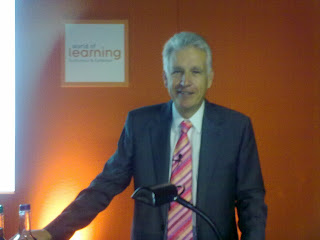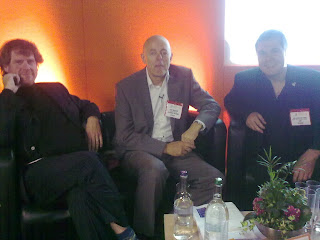WOLCE 2010 Conference Opening
Nicholas Owen, TV presenter opened the conference and welcomed delegates. After a amusing approach to giving the safety information Nicholas guided us through the plan and scope of the sessions on offer.
This had to be one of the most engaging approaches to opening a conference I have seen for a long time.
Ruth Spellman – CEO Chartered Management Institute
The title of the session was "A new world for business".
And while Spellman did talk about the future, she was basing her information on data from 2000 & 2005. There was also an assumption that managers need to be qualified and that the majority of managers in post do not hold appropriate qualifications.
One cannot argue that managers lack skills – Spellman cited RBS and other recent examples of businesses lacking management competence, however are qualifications really the way forward?
Some of the most compelling parts of Spellmans presentation to me were:
1) boards need to take ownership for L&D
2) management/ leadership development is critical
3) management and understanding of risk is vital
4) innovation can be incremental as well as massive change.
LunchTime panel debate on the value of social media on learning
This lunchtime panel event looked at some of the real fast changing challenges facing all learning and development professionals.
Nicholas Owen Chaired the panel featuring: Nick Shackleton-Jones, Clive Shepherd and Robin Hoyle.
The premise of the debate was about the value of social media as a learning vehicle in business.
One issue raised was the term "Social Media" in a business context, in addition there were discussions around the lack of controls of allowing staff to get involved in the use of social media at work.
Certainly there is a case against allowing staff to use social media platforms in an unstructured way, however there are as many flavours of social media as they are ice cream flavours or chrisps flavours, and what works in one culture wont work in another.
What the panel did appear to agree on was the use of blogs as a tool for capturing personal learning, and when available to peers can help ensure learning is both accurate and available to others to learn from. The big questions is should the blog be public or just available to those inside the organisation? Examples were given as to the value of blogs for personal development. This is no different to the learning logs of the 90’s or those used by apprentices and trainees for decades – just that it is easy to share the learning and searchable – thus forming a part of the knowledge management of the organisation.
Throughout this debate the term "informal learning" was used. this is an increasingly popular phrase – and speaking to another conference delegate she mention one firm even having an "informal learning manager" – that is soooo wrong on many levels:
1) as soon as "informal" learning has a structure it is no longer informal
2) "learning" is something the learner does – so we can create opportunities – not learning – the individual has the choice to learn or not from an experience
The sooner we in L&D stop trying to control all learning and recognise that learning is for fun and business – it is not a process to be managed the better.
A good debate – but much like King Canute trying to hold back the waves, social media is here and being used. It is not something we can stop – harness or let it wipe us out!
Leadership development & innovation
It was only after this session that I saw that QEDConsulting were exhibiting and showcasing a product called "the creatrix" – an innovation tool that looks at creativity and risk – in the context of management and leadership development.
Other Stands of note were of course the TrainingZone Stand!
Watch Nicholas Owens summary of World of Learning Day 1
WOLCE 2010 Conference Opening
Nicholas Owen, TV presenter opened the conference and welcomed delegates. After a amusing approach to giving the safety information Nicholas guided us through the plan and scope of the sessions on offer.
This had to be one of the most engaging approaches to opening a conference I have seen for a long time.
Ruth Spellman - CEO Chartered Management Institute
The title of the session was "A new world for business".
And while Spellman did talk about the future, she was basing her information on data from 2000 & 2005. There was also an assumption that managers need to be qualified and that the majority of managers in post do not hold appropriate qualifications.
One cannot argue that managers lack skills - Spellman cited RBS and other recent examples of businesses lacking management competence, however are qualifications really the way forward?
Some of the most compelling parts of Spellmans presentation to me were:
1) boards need to take ownership for L&D
2) management/ leadership development is critical
3) management and understanding of risk is vital
4) innovation can be incremental as well as massive change.
LunchTime panel debate on the value of social media on learning
This lunchtime panel event looked at some of the real fast changing challenges facing all learning and development professionals.
Nicholas Owen Chaired the panel featuring: Nick Shackleton-Jones, Clive Shepherd and Robin Hoyle.
The premise of the debate was about the value of social media as a learning vehicle in business.
One issue raised was the term "Social Media" in a business context, in addition there were discussions around the lack of controls of allowing staff to get involved in the use of social media at work.
Certainly there is a case against allowing staff to use social media platforms in an unstructured way, however there are as many flavours of social media as they are ice cream flavours or chrisps flavours, and what works in one culture wont work in another.
What the panel did appear to agree on was the use of blogs as a tool for capturing personal learning, and when available to peers can help ensure learning is both accurate and available to others to learn from. The big questions is should the blog be public or just available to those inside the organisation? Examples were given as to the value of blogs for personal development. This is no different to the learning logs of the 90's or those used by apprentices and trainees for decades - just that it is easy to share the learning and searchable - thus forming a part of the knowledge management of the organisation.
Throughout this debate the term "informal learning" was used. this is an increasingly popular phrase - and speaking to another conference delegate she mention one firm even having an "informal learning manager" - that is soooo wrong on many levels:
1) as soon as "informal" learning has a structure it is no longer informal
2) "learning" is something the learner does - so we can create opportunities - not learning - the individual has the choice to learn or not from an experience
The sooner we in L&D stop trying to control all learning and recognise that learning is for fun and business - it is not a process to be managed the better.
A good debate - but much like King Canute trying to hold back the waves, social media is here and being used. It is not something we can stop - harness or let it wipe us out!
Leadership development & innovation
It was only after this session that I saw that QEDConsulting were exhibiting and showcasing a product called "the creatrix" - an innovation tool that looks at creativity and risk - in the context of management and leadership development.
Other Stands of note were of course the TrainingZone Stand!
Watch Nicholas Owens summary of World of Learning Day 1







